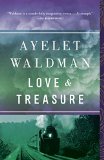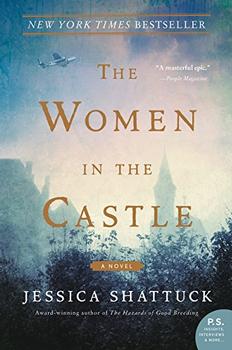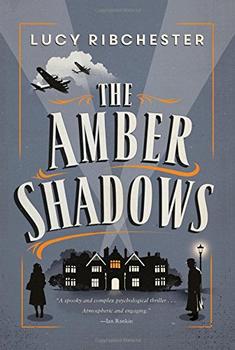Summary | Excerpt | Reading Guide | Reviews | Beyond the book | Read-Alikes | Genres & Themes | Author Bio

Grainy photographs of tormented prisoners and piles of skeletal corpses often dominate modern memory of the Holocaust — a tragedy of unimaginable depth not just for the Jews of Europe but for the entire world. Most of us are all too familiar with the stories of suffering that pepper the first half of the 20th century. It is therefore hugely refreshing when we can glance out of our sphere of knowledge and look at this history from an entirely different angle.
A fresh perspective is precisely what author Ayelet Waldman has given us in Love and Treasure. The year is 1945. In a war-torn corner of Austria, Jack Wiseman and his fellow American GIs stumble across a freight train bound for Hungary filled with jewels and furs down to the most humble of worldly possessions — all items stolen from murdered Hungarian Jews.
Rather stereotypically, caught up in this great tragedy is great love. During an altercation with the train's captors, Jack meets and eventually falls for Ilona, a concentration camp survivor searching for her sister. In his bid to find anything that might belong to her family, Jack stumbles across an enamel necklace depicting a bright peacock, in the looted goods. The peacock is an omen auguring bad luck in Hungary but the necklace is an object that will draw the strands of Waldman's sweeping tale together.
From Jack's narrative we jump to the present day, following his granddaughter Natalie who, bequeathed the striking necklace and mindful of her grandfather's final wish to return it to its rightful owner, is determined to do just that. Her companion on this mission is a young art dealer who seeks his own treasure: a disturbing portrait whose subject wears the same necklace around her neck.
Waldman then transports us back to earlier times — to the lives of Hungarian Jews before the war, quite oblivious of their ghastly fate. Here we explore Budapest and meet the original owner of this very special piece of jewelry. We experience this pre-war society through the eyes of young suffragist Nina and it is through her that the final dramatic portion of this tale is unraveled.
This is a multi-faceted, sensitively handled piece of historical fiction. Mindful of the very real tragedies that are its inspiration we explore an aspect of the destruction of European Jewry that we might otherwise overlook - i.e. the "stuff" left behind. Out of the millions of people who died, what happened to their beloved possessions? Engaging works of literature such as this can go some way in ensuring that people know.
A surprising amount is squeezed into a modest number of pages. Tackling themes such as the Holocaust and its aftermath and the Suffragist movement, Love and Treasure could have easily become bogged down or merely skimmed the surface. Waldman, however, avoids this trap; everything here has its purpose. Even death and destruction are dealt with in a subtle fashion — with the most horrific incidents having already happened or occurring off-screen — making the novel all the more powerful and allowing room for reflection.
However, although the three-part narrative refreshes us with something a little different every one hundred pages or so, the stark contrast between each section's voices, themes and mood felt a little jarring. This was particularly true of the contemporary portion that separates the two period pieces. Shifting from old-fashioned courting and flouncy dresses to mobile phones and casual sex required a serious mental adjustment in this reader.
That having been said, most elements of this stimulating novel are there for a very good reason. The Holocaust often proves to be literary gold dust as authors explore the reactions of human beings forced into situations far beyond their control. The characters here hold up to circumstance, with their shortcomings becoming an essential part of the story. Ayelet Waldman has had great success in her writing career, and I can safely say that Love and Treasure has the vivacity and courage to reach lofty heights as well.
![]() This review was originally published in The BookBrowse Review in June 2014, and has been updated for the
February 2015 edition.
Click here to go to this issue.
This review was originally published in The BookBrowse Review in June 2014, and has been updated for the
February 2015 edition.
Click here to go to this issue.

If you liked Love and Treasure, try these:

by Jessica Shattuck
Published 2018
Three women, haunted by the past and the secrets they hold.

by Lucy Ribchester
Published 2017
During the dangerous days of World War II, Honey Deschamps is spending her days transcribing decrypted messages at Bletchley Park, when she starts to receive bizarrely coded packages. When everyone is keeping secrets, who can you trust?
Your guide toexceptional books
BookBrowse seeks out and recommends the best in contemporary fiction and nonfiction—books that not only engage and entertain but also deepen our understanding of ourselves and the world around us.